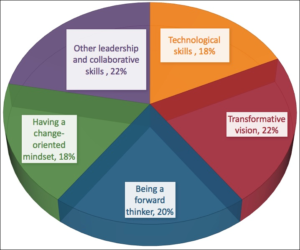The impact of digital disruption continues to impact all industries including the graphic arts business. Evidence can be found on the McKinsey consulting website which contains content focused on Digital Disruption and a new focus area called Digital McKinsey. Contrary to popular belief however, addressing the issues of digital disruption requires more than understanding the technology. It requires a business sense or business acumen.
A 2016 study conducted by MIT Sloan Management Review and Deloitte, found that 90% of respondents anticipate their industries will be disrupted by digital trends. More importantly, only 44% say they are adequately preparing for the disruptions to come. In the article, “Aligning the Organization for Its Digital Future,” only 18% of respondents reported that technological skills were the most important skill for leaders to succeed.
Question: What is the most important skill for leaders to succeed in a digital environment?

Source: MIT SMR/Deloitte Digital Business Global Executive Study 201
How Does Digital Disruption Impact Business?
Effectively addressing digital disruption requires understanding more than technology; it requires understanding how the technology impacts the business, which is business acumen. But that is a somewhat limiting definition. If you search the web you can find many different definitions. The one I like is from the Financial Time Lexicon:
“Business acumen is keenness and speed in understanding and deciding on a business situation. In practice, people with business acumen are thought of as having business ‘sense’ or business ‘smarts’. They are able to obtain essential information about a situation, focus on the key objectives, recognize the relevant options available for a solution, select an appropriate course of action and set in motion an implementation plan to get the job done.”
I like this definition for two reasons. First, compared to many others, it does not focus on the importance of business concepts or finance language per se, but instead on the importance of business sense or savvy. Second, it includes an aspect of project management skills which I believe is one of the greatest challenge. When we work with companies to address digital disruption issues, it is not that
managers don’t know “what is going wrong.” They understand the problem, but more often, struggle with “what to do” and “how to get it done.”
The impact of digital disruption in the printing industry is not going away– in fact, it is growing. Companies that want to succeed need to provide the skills required by management and train managers how to identify, measure, and build strategies to counter these disruptions.
Howie Fenton is an independent consultant and trusted advisor to commercial and in-plant printers. He recommends equipment, best practices and workflow automation tools to streamline operations. To learn more e-mail Howie@howiefentonconsulting.com.



